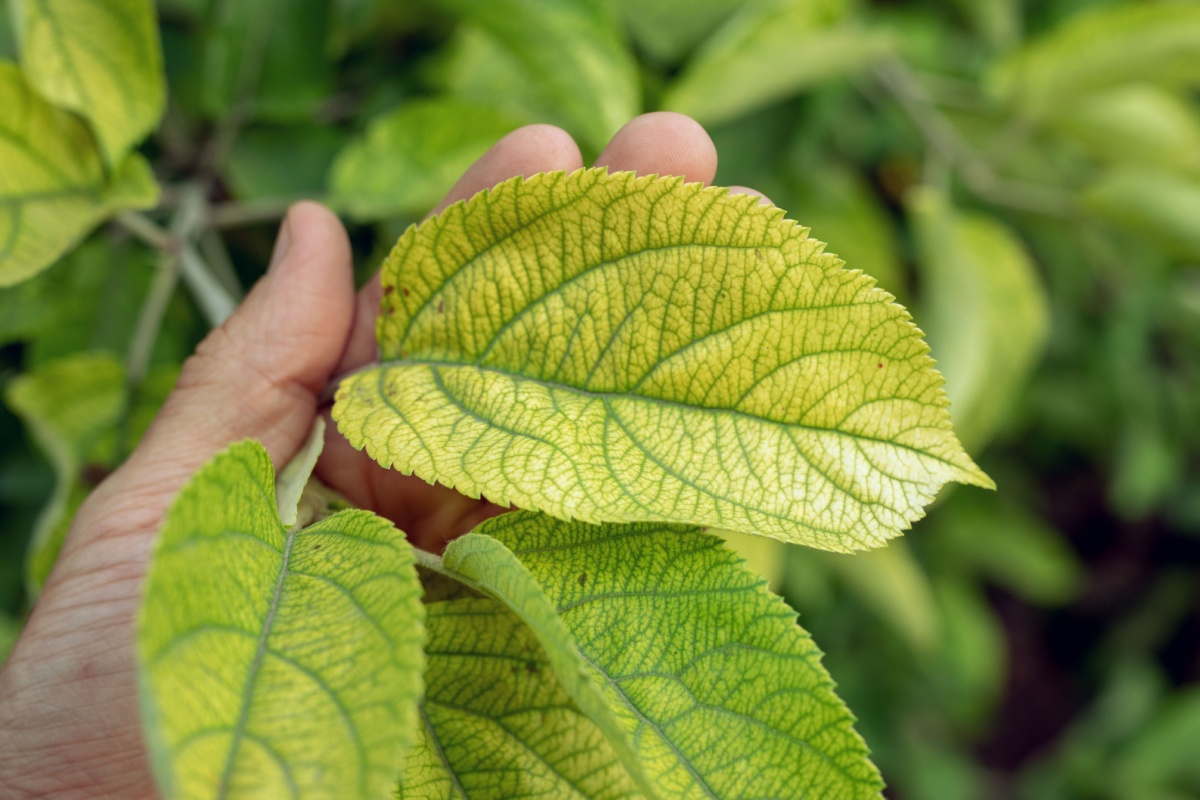
While fall is a favorite season for many, with its cool temperatures, rich colors, hot ciders, pumpkin spice lattes, and fun holidays, the last thing you want is for autumn to make an early appearance in your yard. Unfortunately, this can happen when your tree’s leaves turn yellow well before fall. If this is happening to your tree, you may be wondering what’s going on.
In most cases, the premature yellowing of tree leaves is a sign of a condition known as chlorosis. While chlorosis may not be immediately life-threatening to your tree, it is a red flag that should not be ignored. When left untreated, chlorosis can compromise your tree’s health and longevity. Thankfully, with the right care, you can correct this condition and ensure your tree stays vibrant and healthy for years to come.
What Is Chlorosis & Why Does It Cause Yellow Tree Leaves?
Chlorosis is a condition where leaves produce insufficient chlorophyll, the pigment responsible for giving leaves their green color and enabling photosynthesis. Without enough chlorophyll, the leaves can’t efficiently convert sunlight into energy, and they begin to yellow as a result. As chlorosis progresses, affected trees not only look unhealthy but actually become weakened, with reduced growth, smaller leaves, and increased vulnerability to pests and diseases.
Chlorosis isn’t a disease, but rather a symptom of underlying issues affecting your tree’s ability to take in or use essential nutrients. When chlorophyll production falters, the vibrant green fades, and pale yellow tree leaves emerge. In some cases, leaf veins remain green while the rest of the leaf yellows — this symptom often distinguishes chlorosis from other tree diseases.
What Causes Chlorosis & Yellowing Leaves?
Trees are strong, resilient, and pretty self-sufficient. Unfortunately, an array of external factors can interfere with their life cycle, resulting in premature leaf discoloration. Some of the top reasons trees are unable to absorb nutrients and produce chlorophyll include:
Iron Deficiency
Iron is a key element in chlorophyll production. When trees don’t get enough iron — either due to low availability in the soil or the tree’s inability to absorb it — leaves can begin to yellow. This is especially common in soils with high pH levels, which bind up iron and make it inaccessible to tree roots.
Other Micronutrient Deficiencies
While an iron deficiency is often the primary suspect for chlorosis, deficiencies in manganese and zinc can also result in tree leaves turning yellow. These nutrients play essential roles in plant metabolism and enzyme activation. Without them, trees can struggle to photosynthesize effectively.
Compacted Soil
When soil becomes compacted, oxygen levels drop, and root function suffers. Eventually, if the problem isn’t resolved, the tightly packed soil can reduce the tree’s ability to absorb water and nutrients. Over time, this can indirectly lead to chlorosis.
Poor Drainage
Waterlogged soil suffocates tree roots by depriving them of oxygen, which in turn prevents them from taking up nutrients effectively. The resulting leaf discoloration often mimics the symptoms of nutrient deficiencies, but the underlying cause, of course, is different. If your yard tends to stay wet for days after rain, poor drainage could be causing your tree’s yellow leaves.
Drought Stress
When trees don’t receive adequate water, they cannot transport nutrients effectively, leading to chlorosis-like symptoms. In severe cases, drought-stressed trees may prematurely drop their leaves entirely in an effort to survive with limited water resources.
Root Damage
Construction work, heavy foot traffic, and aggressive digging around a tree can damage its roots. Compromised roots, of course, struggle to provide the necessary nutrients to the tree’s canopy, making chlorosis a likely outcome. It’s important to note that damage to the tree’s roots doesn’t have to be extensive; even minor injuries can have significant effects over time.
How to Treat Trees With Yellow Leaves in the Summer
So, what should you do if your tree leaves are turning yellow? The first step is a proper diagnosis. Don’t jump to conclusions — yellowing leaves can also be caused by pests, diseases, or seasonal stressors. Contacting a tree care specialist is key to identifying the true cause. Once diagnosed, treatment typically targets the underlying issue. For this reason, treatment for yellow tree leaves may include:
- Foliar Sprays: Foliar sprays deliver iron directly to a tree’s leaves for fast results. Since this treatment method doesn’t address underlying soil problems, it may need to be paired with other solutions for the best results in the long term.
- Trunk Injections: With this treatment, iron is injected directly into the tree’s vascular system. This allows the tree to absorb nutrients immediately and is often used for more severe cases of chlorosis. The effects last longer than foliar sprays and help the tree recover more effectively.
- Soil Amendments: Adding iron chelates to the soil provides a longer-term solution by enriching the soil with bioavailable iron.
- pH Adjustments: If the soil’s pH is too high, iron and other nutrients become chemically bound and unavailable to the tree. Applying elemental sulfur or incorporating organic matter can gradually lower soil pH, restoring nutrient accessibility and improving chlorophyll production.
- Soil Aeration: Compacted soil reduces root efficiency and nutrient uptake. Aerating the soil improves air and water movement, promoting healthier roots and helping the tree access vital nutrients.
- Improving Watering Practices: Both overwatering and underwatering can interfere with nutrient absorption. Adjusting watering practices to suit the tree’s needs ensures that roots stay healthy and capable of taking in nutrients from the soil.
- Proper Mulching: A layer of mulch helps soil retain moisture and suppresses weed competition. Make sure to spread it evenly around the base of the tree to support healthy root function and nutrient uptake.
Your Best Strategy Is to Prevent Chlorosis From the Start
Why wait until your tree is waving yellow flags when prevention is possible? Smart tree care practices can help reduce the risk of chlorosis from ever developing. First, choose tree species well-suited to your soil type and local climate. Before planting, test your soil’s pH and nutrient levels to ensure optimal growing conditions.
Once your trees are in the ground, monitor their health regularly. Avoid compacting the soil around the base, and make sure your watering habits match your tree’s specific needs. And remember: Mulch is your friend. A layer of mulch helps maintain soil moisture, prevents extreme temperature swings, and limits weed competition. Just remember not to pile the mulch too high around the trunk — the root flare should still be visible.
Are Your Tree’s Leaves Yellow? Call Lawn Specialties!
If your tree’s leaves are turning yellow this summer, call the experts at Lawn Specialties. We will conduct a thorough tree inspection, test the surrounding soil, evaluate nutrient levels, and design a personalized treatment plan that will restore your tree’s rich, green hue. We look forward to helping your trees thrive through every season.

